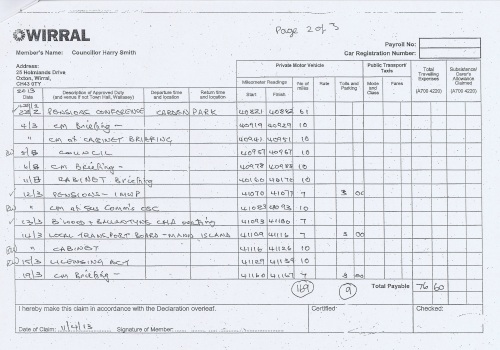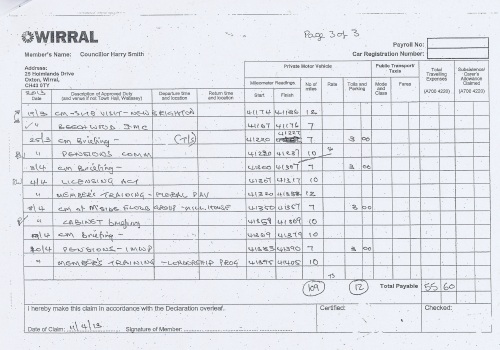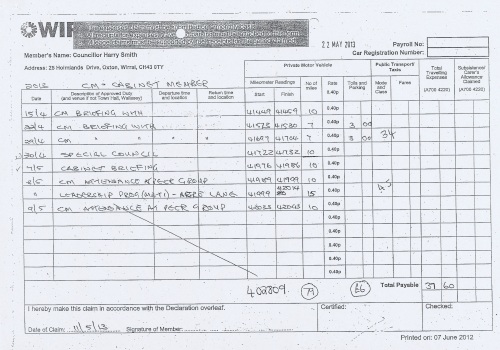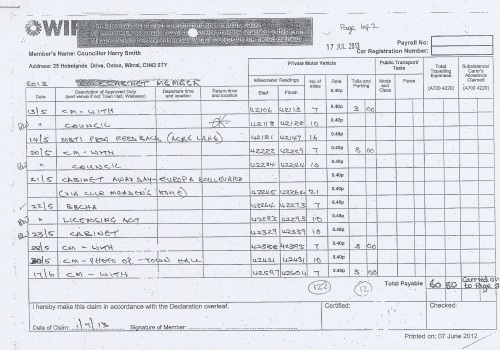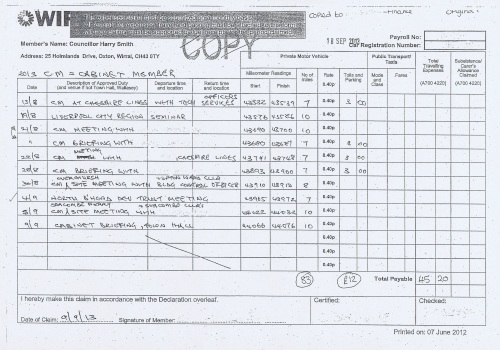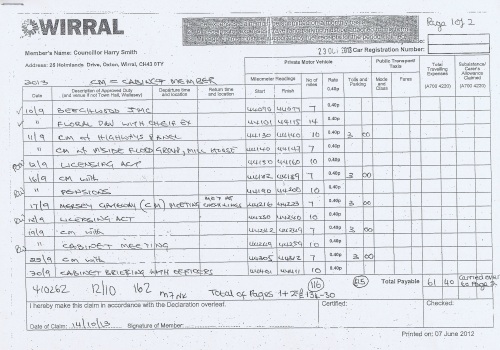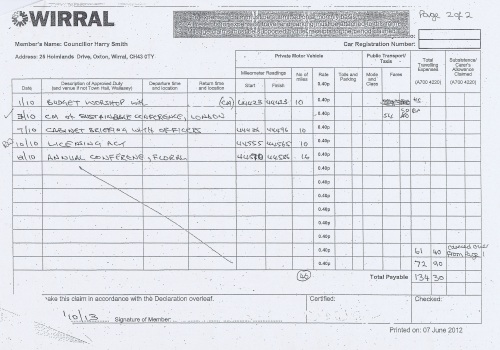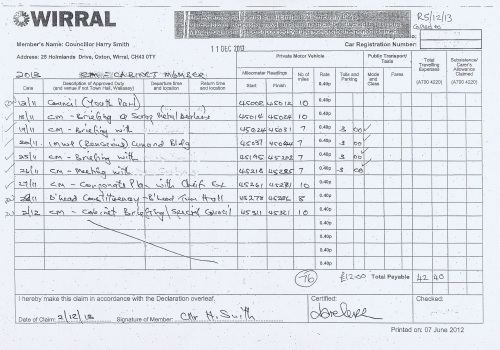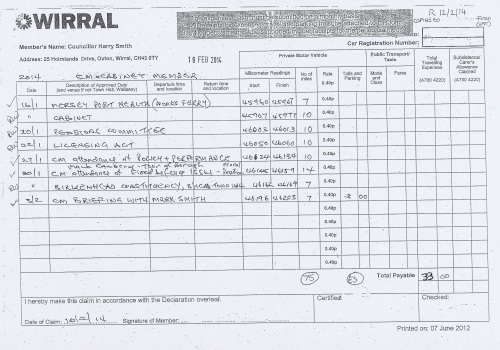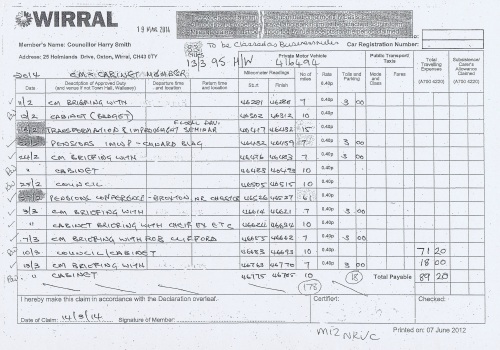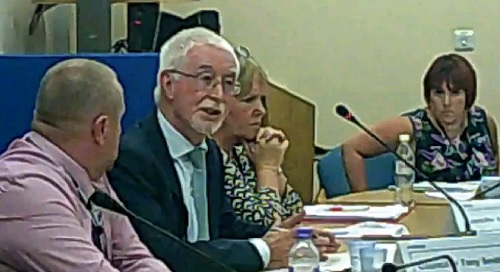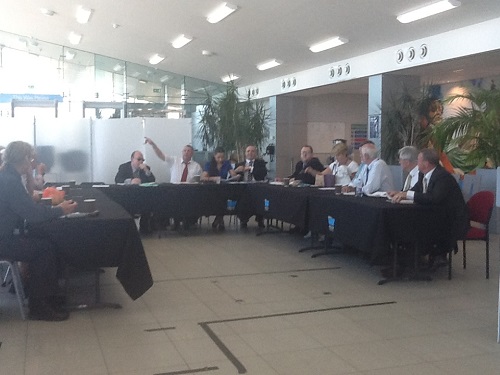Wirral Council takes the view that its rights matter more than Wirral citizen’s human rights
Following Friday’s blog post Wirral Council councillors ban filming at public meeting to decide on alcohol licence for Michaels of Moreton shop, there have been some reactions to what happened.
Councillor Stuart Kelly writes:
Indeed they have Councillor Kelly. As long ago as February 2011, the Parliamentary Under Secretary of State Bob O’Neill MP wrote to all Council Leaders and Monitoring Officers. He states in his letter “It is essential to a healthy democracy that citizens everywhere are able to feel that their council welcomes them to observe local decision-making and through modern media tools keep others informed as to what their council is doing.” and “the mainstream media also needs to be free to provide stronger local accountability by being able to film and record in meetings without obstruction”. He goes on to write “I want to encourage all councils to take a welcoming approach to those who want to bring local news stories to a wide audience. The public should rightly expect that elected representatives who have put themselves up for public office be prepared for their decisions to be as transparent as possible and welcome a direct line of communication to their electorate.”
In the same letter, the Information Commissioner’s Office stated “In the context of photographing or filming meetings, whilst genuine concerns about being filmed should not be dismissed, the nature of the activity being filmed – elected representatives acting in the public sphere – should weigh heavily against personal objections.” Yet at Wirral Council this advice last Friday was not followed!
Former councillor Ian Lewis states on his new blog “We know most councillors have faces made for radio but their bizarre behaviour at this meeting, over a licensing application in Moreton, sets a new (low) standard”.
So why is Councillor Steve Niblock from the Chair making a unilateral decision about filming on behalf of the three person Licensing Act 2003 subcommittee? Regulation 25 referred to by Ken Abraham states “authority” (which is defined in Regulation 2 as meaning the whole subcommittee) expressing an opinion on disruption, not the Chair unilaterally expressing his opinion and expecting Regulation 25 to apply.
After the public were excluded from the Licensing Act 2003 subcommittee meeting on Friday, I had a talk with the legal adviser to the committee Ken Abraham about my concerns about it and that the public hadn’t been excluded properly from the meeting. This was a conversation in a corridor at the Town Hall in front of my wife, so I don’t think there can be any expectation of privacy!
KEN ABRAHAM (legal adviser to the Licensing Act 2003 subcommittee)
Can I speak to you after?
JOHN BRACE
I’ve had a chance to have a chat to the objector what it was about and he doesn’t have any objections to me filming. Will there be any problems with me filming the decision?
KEN ABRAHAM
Well it would be useful to find out why you’re filming.
JOHN BRACE
OK.
KEN ABRAHAM
because this is obviously you know, it’s a public Council meeting as in a public Council meeting, this is a what’s known as a public hearing, but there are people who attend who are obviously not aware that they’re going to be filmed so and…
JOHN BRACE
My point about filming, I’ll answer your question about why and then talk a bit about filming. The reason why is because there are people that can’t make it to these meetings, whether they’re at work during the day or
KEN ABRAHAM
People can have a look at the minutes.
JOHN BRACE
Yes, but the minutes aren’t published immediately.
KEN ABRAHAM
but then you could edit the filming.
JOHN BRACE
Err, clearly I could but I don’t. Anyway,
KEN ABRAHAM
The issue is that when you were asked to stop filming the other week, you still continued filming.
JOHN BRACE
No, sorry the other week when I was asked to stop filming I did and then we went out and came back in and it wasn’t clear then as to whether that carried on or not.
KEN ABRAHAM
The stopping filming?
JOHN BRACE
Yeah, because if you remember the other week, the meeting started, they were asked the question about objecting to filming. One person said yes, then we were all asked to go out, then we all came back in again and it wasn’t clear as you’ve said it’s not clear when we came back in again.
To be honest I did say things there but he [Councillor Steve Niblock] didn’t want me to speak anyway, so it’s hardly a valid reason.
KEN ABRAHAM
Well it’s not a public meeting, (at this point I link to Regulation 14 (which states it’s to take place in public), link to 100A and 100E of the Local Government Act 1972 which state otherwise to Ken’s assertion that it isn’t a public meeting. In fact earlier in the conversation he stated it was a public meeting.)
KEN ABRAHAM
and you’re not a representative or the, I I I if you want to talk in more detail I can.
JOHN BRACE
I do want to
KEN ABRAHAM
but I just need to, we’re still in the hearing,
JOHN BRACE
I just want to speak to you in more detail.
KEN ABRAHAM
Maybe if we do that after?
JOHN BRACE
The other very brief point I want to make, the first thing is any decision that a public authority makes has, due to the Human Rights Act 1998 to be compatible with the Convention on Human Rights so one of those rights is regarding freedom of expression and regarding the Article 10 right to freedom of expression there has to be a specific power the Council has in law to stop filming and it has to be for one or more of
KEN ABRAHAM
Yes, I hear you. You’re quoting the law, I know the law. We have rights under the regulations too, which empower them to stop a hearing proceeding if there is an issue about disrupting the meeting and the Chair took the view at that time that because it was clearly indicated that he didn’t want filming that he could have asked you to leave the room but he didn’t. As a filming condition to remain, to put the camera off.
JOHN BRACE
Yes, which I did.
KEN ABRAHAM
The licensing regulations are very clear and specific on that point.
JOHN BRACE
Unfortunately the licensing regulations don’t say anything about filming as such.
KEN ABRAHAM
but it talks about, it talks about the, this is why I can’t have a, I can have a discussion but not
JOHN BRACE
The other thing I wanted to say, let me say something. When the public were sent out,
KEN ABRAHAM
Yes.
JOHN BRACE
The law regarding public exclusion, I’m talking about the Local Government Act 1972, states there has to be a resolution and under the terms of [Wirral Council’s] constitution a resolution has to be proposed, seconded and voted on. That didn’t happen.
KEN ABRAHAM
This is a licensing hearing under the hearing regulations,
JOHN BRACE
Yes, but even in the regulations, the licensing regulations, it says they have to consider the public interest in favour of the public [staying] against excluding the public and they didn’t have a discussion about that.
KEN ABRAHAM
There was, there was representations by the Chair, by the individuals attending the meeting and those representations were taken on board. I’ve got to go off.
JOHN BRACE
but you understand my point about the filming issue and the point about the..
KEN ABRAHAM
Well people are entitled to object to that,
JOHN BRACE
and I pointed out I wasn’t filming that side
KEN ABRAHAM
It doesn’t matter, you’re still taking, you’re recording what individuals were saying
JOHN BRACE
Yes.
KEN ABRAHAM
and people can object to that if they’re members of the public.
JOHN BRACE
To be honest, I could just write it down
KEN ABRAHAM
exactly
JOHN BRACE
and type it up
KEN ABRAHAM
exactly, exactly. You could write it up, but at least you know, you know and that’s something that if you’re going to attend regularly, you know, the public needs to be and if it causes disruption at the hearing then we’re quite entitled to say, oh
JOHN BRACE
and can I say there’s also the Openness of Local Government Bodies Regulations which are going through Parliament and come into effect in a few weeks time.
KEN ABRAHAM
We’re not talking about councillors, we’re talking about members of the public.
JOHN BRACE
but we’re talking about public meetings here, not a public meeting of the full Council. In a few weeks time those regulations will come into effect and they actually prevent the Council from preventing filming at public meetings. They’re in draft form at the moment if you want to look at them.
KEN ABRAHAM
Yeah, well you don’t have to tell me word for word. The regulations are clear on the issue. It gives the Members the leeway to stop if there is a meeting that’s being filmed and the meeting could be disrupted or the hearing could be disrupted, they are entitled to take a view.
JOHN BRACE
Could you show me a copy of the particular regulation or ..
KEN ABRAHAM
Regulation 25,
JOHN BRACE
Regulation 25
KEN ABRAHAM
Licensing [Act 2003] Hearing Regulations [2005], alright and you can actually read the rule, end of story.
JOHN BRACE
OK, but it’s also a public meeting and we have a statutory right to be there.
KEN ABRAHAM
and you have the statutory right to be excluded.
JOHN BRACE
and the thing is right, if I was excluded and asked to leave, I could leave the camera running and leave.
KEN ABRAHAM
No, no, they have the right to exclude you, but the issue has if you’re going to attend these hearings, then members of the public must be aware of that, because they are not aware that you’re doing their filming and we don’t know what’s going to be done when it’s put on the website.
JOHN BRACE
And in fact if I’d answered the question about what the purpose of the filming, but the Chair wouldn’t let me answer it. When I explained it to him he said he had no objection.
KEN ABRAHAM
I said we’d have a discussion, that’s it. We’re not allowing you to have a discussion during
JOHN BRACE
But we’re having one!
KEN ABRAHAM
We’re not having one. Are you aware of the purpose of this discussion? You’re shouting at me!
JOHN BRACE
I’m not!
KEN ABRAHAM
The view that I’m going to take with you isn’t going to change. They tried to make a view on the hearing regulations and you know the people are members of the public and are going to object for whatever reason errm, Members are entitled under the regulations to take a view.
JOHN BRACE
Well actually we disagree on that.
KEN ABRAHAM
Well we’ll agree to disagree then.
Finally I include an email of Surjit Tour sent to me last year.
from: Tour, Surjit
to: john.brace@gmail.com
cc: stephengerrard@wirral.gov.uk
date: 2 April 2013 16:08
subject: RE: filming of public meetings
mailed-by: wirral.gov.uk
Dear Mr Brace
I am on annual leave until 15 April. I am somewhat surprised by your email and letter given that I have asked you a number of times to meet me to discuss this issue.
Furthermore, there no ban on filming as you and another have been filming a number of committee meetings.
I would suggest that no proceedings are issued until I have had the opportunity to respond. I therefore request an extension of time to 30 April.
I await your response.
Please can you also include Stephen Gerrard in any further response.
Yours sincerely
Surjit Tour
Sent from my HTC Touch Pro 2 on Vodafone
**********************************************************************
This email and any files transmitted with it are confidential and
intended solely for the use of the individual or entity to whom they
are addressed. If you have received this email in error please notify
the system manager.
This footnote also confirms that this email message has been swept by
MIMEsweeper for the presence of computer viruses.
www.clearswift.com
**********************************************************************
So it seems two of Wirral Council’s legal team have different views on the filming issue.
If you click on any of the buttons below, you’ll be doing me a favour by sharing this with other people.

